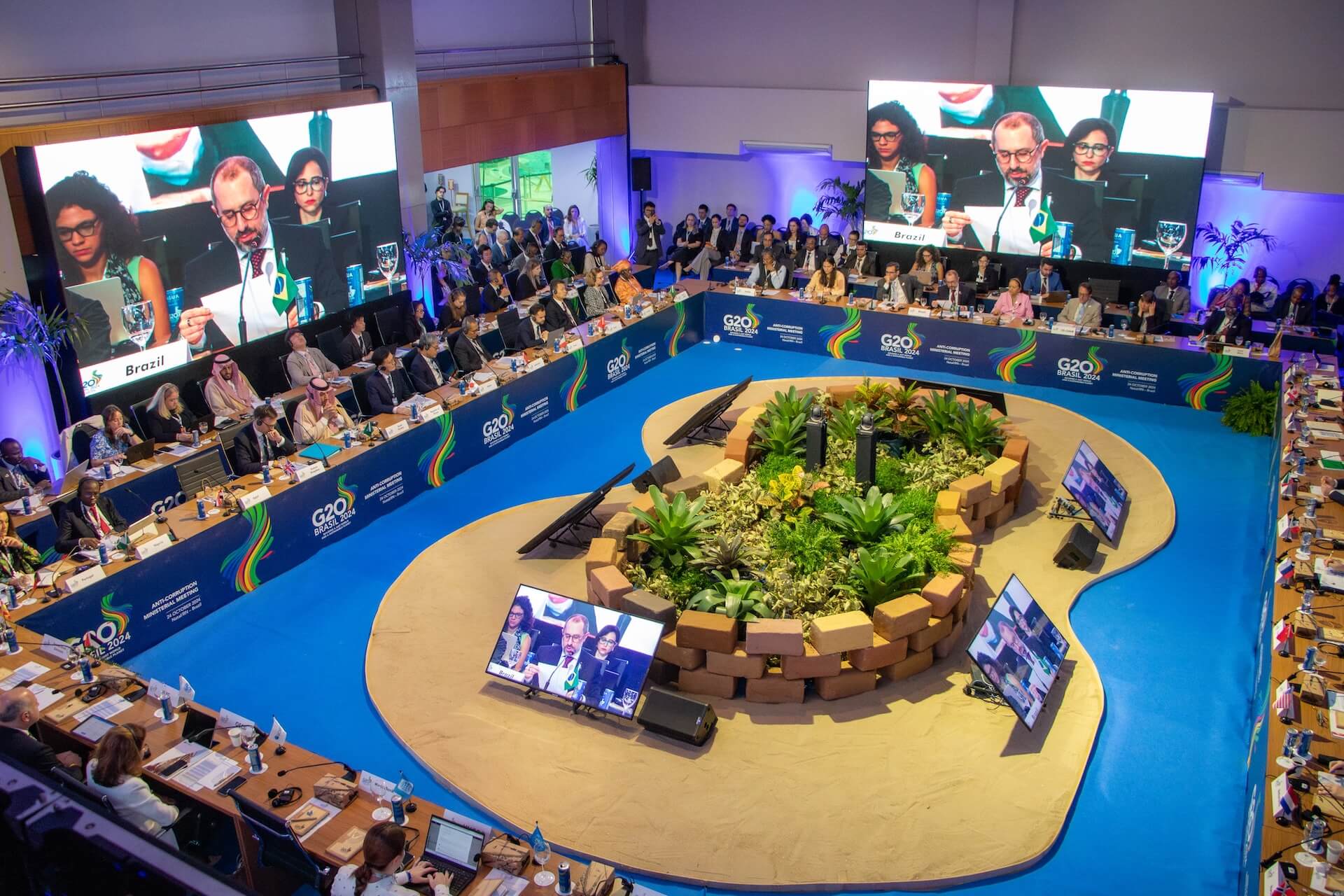G20 reaches consensus on joint actions against global corruption
At the ministerial meeting of the G20 Anti-Corruption Working Group in Natal (RN), Brasil led essential advances in the fight against corruption. The countries reached a consensus on strengthening global integrity, emphasizing the need to foster the adoption of anti-corruption practices in the private sector. The meeting resulted in a declaration that will be presented at the G20 Leaders' Summit in Rio de Janeiro.

In a significant milestone of the global integrity agenda, the ministerial meeting of the G20 Anti-Corruption Working Group, held in Natal (RN) under Brasil's presidency, reached a consensus of the countries on promoting integrity and fighting corruption. The result was the preparation of a ministerial declaration that will be submitted to the G20 leaders during the Heads of State and Government Summit, which will take place in Rio de Janeiro on November 18th and 19th, 2024.
The declaration includes commitments to integrate the fight against corruption into the main global agendas, such as sustainable development and global governance. “It was a joint effort, and we managed to build very relevant consensuses that will be taken to the Leaders' Summit in Rio de Janeiro,” said Minister Vinicius Marques de Carvalho of the Comptroller General of the Union (CGU). He also stressed that corruption is a global challenge that requires coordinated solutions between countries in dialogue with civil society and the private sector. "We cannot move forward without the participation of all people, and the G20 has proved to be a fundamental forum for this discussion," he said.
Representatives of the G20 nations and guests reaffirmed their commitment to tackling corruption, recognizing its harmful impact on economic development, social inequalities, and compliance with the 2030 Agenda for Sustainable Development. The meeting highlighted that corruption is one of the greatest obstacles to sustainable development and equality. It aggravates social and economic inequalities and undermines trust in public institutions. The ministerial declaration endorsed by the group emphasizes that strengthening integrity in all spheres of society, both in the public and private sectors, is essential for building a “just world and a sustainable planet,” the motto of Brasil’s G20 presidency.
During the meeting, Minister Vinicius Marques de Carvalho detailed three main commitments to fighting corruption. The first commitment is to ensure the active participation of civil society in the construction of anti-corruption agendas. According to the minister, the effectiveness of any policy depends on people's direct involvement in its design and implementation. "Agendas only permeate people's lives if they participate in this construction," he said.
The second point addressed was the role of the private sector in fighting corruption. The minister stressed that corruption is not an exclusive problem of the state but also the private sector. "When we talk about corruption, we are talking about someone who corrupts and someone who is corrupted. It is no use dealing with only one side of the issue," he said. The need to develop policies that encourage companies to adopt anti-corruption practices proactively was discussed during the event. "Companies have a central responsibility in this process, and the G20 is committed to encouraging this change," he added.
The third commitment is directly related to sustainable development and concerns fighting corruption in situations of climate disasters. The CGU minister recalled that, in emergencies, such as those that have recently occurred in Brasil, large volumes of resources need to be quickly mobilized to aid the affected populations. However, this scenario also increases the risk of misappropriation and misuse of public funds. “It is in these moments of vulnerability that opportunism can arise, and this cannot happen,” he warned. To avoid this type of problem, he advocated the creation of an integrity agenda focused specifically on managing resources destined for natural disasters, which have become increasingly frequent due to climate change.
Brazilian leadership and the future of the anti-corruption agenda
The choice of Natal as the host of the G20 ministerial meeting on anti-corruption reflects the importance that Brasil has given to the topic, especially in a global context of crises that demand greater transparency and integrity. Minister Vinicius Marques de Carvalho emphasized that the work carried out in Rio Grande do Norte, in partnership with the state government and the Comptroller General of the State, should be an example for other federation units. He highlighted that, with the support of local partners, it was possible to promote an event of great international relevance and with practical developments for global governance.
Member countries also endorsed the G20 Anti-Corruption Action Plan 2025-2027, which outlines common priorities and objectives for strengthening anti-corruption policies globally. The plan reflects the continuity of the G20's efforts to enhance integrity, tackle foreign bribery, and strengthen law enforcement.
Brasil’s G20 presidency was praised for its leadership in developing innovative strategies to fight corruption and its multi-stakeholder approach, including civil society, non-governmental organizations, and the private sector. The meeting concluded with a commitment to continue promoting a culture of integrity and justice in future years. The next G20 presidencies are expected to strengthen the legacy of international cooperation in the fight against corruption.
The governor of Rio Grande do Norte, Fátima Bezerra, participated in the ministerial meeting. She highlighted President Lula's leadership in fighting corruption and the role of the CGU, which has made significant advances in the use of anti-corruption tools. The governor also announced the creation of the “Juventude Sob Controle” (Youth In Control) program to raise youth awareness of citizenship and ethics. She concluded by condemning electoral corruption, highlighting the importance of voting freedom, especially in the elections.
Translated by PGET-UFSC